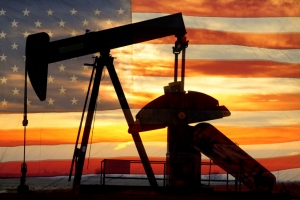Saturday’s surprise attack on Saudi Arabia’s Abaqaiq oil facility in Buqyaq has sent crude oil prices sharply higher. There are estimates of up to 5.7 Million Barrels per Day (MMB/D) of lost output. For perspective, the last two big drops in crude oil, in 2008 and 2014-16, were caused by around 2% excess supply. The lost Saudi output, half of what that country produces, represents around 5% of world demand.
It’s unclear how long it will take to repair the damage. Estimates are at least several weeks. Saudi Arabia has assured buyers that deliveries will be augmented from crude kept in storage.
Regardless of where crude prices go, owning energy infrastructure in the U.S. looks a bit smarter (see U.S. Insulated From Possible

Landscape image of a oil well pumpjack wiith an early morning golden sunrise and American USA red White and Blue Flag background.
Supply Shock After Saudi Attack). U.S. production is decentralized, making it virtually impossible for a single attack anywhere to disrupt a significant portion of output. And while terrorism remains a relentless threat, the U.S. has shown it is able to protect its vital assets.
Although crude oil prices will initially provide a lift to the perennially downtrodden midstream energy infrastructure sector, we think investors will reassess sources of energy supply based on stability. This should provide more enduring support to a business that is wholly based in North America, far removed from the world’s unstable regions and increasingly the world’s marginal producer.
Much of the world’s energy comes from politically unstable parts of the world (see Investors Look Warily at the Persian Gulf). The Shale Revolution has provided America with more geopolitical flexibility to pursue its aims without worrying about OPEC cutting supplies (see U.S. Plays Its Foreign Policy Hand Freed From Oil). Growing domestic production gives America greater control over its economy (see Shale Security).
The post America Offers Safer Energy appeared first on SL-Advisors.

